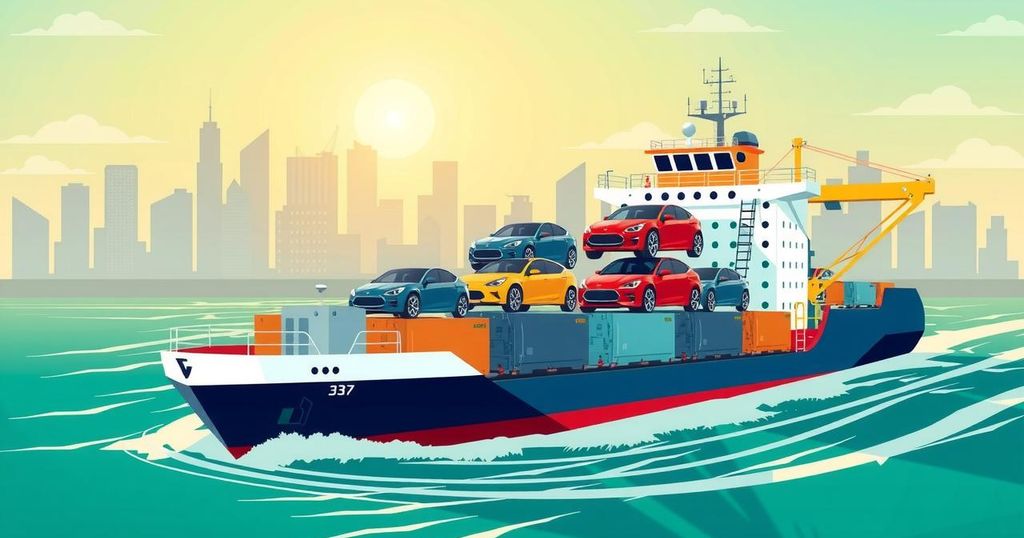BYD Boosts Electric Vehicle Shipments to Brazil Ahead of Tariff Increases
BYD is increasing its electric vehicle shipments to Brazil ahead of rising tariffs. Sales of EVs are soaring, but concerns linger about BYD’s production plans in Brazil amid legal challenges. The tariff changes will significantly impact the market, increasing from 18% to 25% in July, with peak rates expected at 35% by July 2026. Local manufacturers worry about the implications for domestic investment and production.
Chinese electric vehicle manufacturer BYD has significantly increased its shipments to Brazil in anticipation of an impending tariff hike. The report from Reuters highlights that the number of electric vehicle (EV) exports is scaling new heights as the viability of BYD’s production ambitions in Brazil becomes less certain.
The market for electric and hybrid vehicles in Brazil, which ranks as the world’s sixth-largest car market, is rapidly expanding. The Brazilian Association of Electric Vehicles (ABVE) reports a staggering 85 percent increase in sales predicted for 2024, pushing the total above 170,000 units. Currently, electric vehicles comprise approximately 7 percent of new car sales, with BYD experiencing a whopping 328 percent increase in sales last year, summing up to 76,713 units.
However, the attractive tariff conditions that initially drew BYD to Brazil back in 2015 are about to shift. Imported electric vehicles, which enjoyed a tariff-free status a decade ago to encourage adoption, will face a progressive tariff structure beginning at 10 percent in January 2024. This will rise every six months, with a potential peak of 35 percent by July 2026. Presently, the tariff stands at 18 percent and is set to increase to 25 percent in July, propelled by lobbying from Anfavea, the influential Brazilian automakers’ association. According to a government spokesperson, this request for accelerated tariff implementation is still under review.
Chinese automotive exports to Brazil are estimated to surge by nearly 40 percent this year, reaching about 200,000 units, according to the country’s main automotive association. Reports indicate that BYD has already exported around 22,000 vehicles to Brazil in the current year. Recently, the company deployed the world’s largest car-carrying ship to facilitate this increase. Additionally, there is a government policy allowing toll-free imports up to US$169 million for plug-in hybrids and US$226 million for battery electric cars until July 2025, making it a good time for early imports.
While Brazilian consumers express enthusiasm for the affordable EV options, local automakers view the spike in imports as concerning. They suggest it signals a retreat by BYD from its commitment to building a manufacturing base in Brazil. In 2023, BYD acquired a former Ford factory in Brazil, but it faced significant issues last December when 163 construction workers were found to be living in what were described as “slavery-like conditions” at the site. Although BYD condemned the contractor and severed ties, the ongoing legal issues surrounding this labor scandal have pushed back the timeline for “fully functional” production to December 2026, according to local authorities.
Igor Calvet, president of Anfavea, stated, “We support the arrival of new brands in Brazil to produce, promote the components sector, create jobs and bring new technologies. But from the moment that an excess of imports causes lower investment in production in Brazil, that worries us.” He added that the confederation has yet to see any local supplier relationships or contracts developed concerning the BYD plant, which typically would materialize around 18 months prior to production.
Meanwhile, fellow Chinese company GWM, which acquired a factory in Brazil in 2021, is set to commence production of its hybrid Haval H6 SUV next month. Ricardo Bastos, director of government relations at GWM Brazil and president of ABVE, mentioned they are in discussions with around 100 suppliers based in Brazil for potential contracts. However, he noted that the necessary infrastructure for producing all components for electric vehicles is still lacking in Brazil.
In summary, BYD is ramping up its exports to Brazil ahead of upcoming tariff hikes, signaling both opportunity and concern for local automakers. The Brazilian market for electric vehicles is booming, yet internal production ambitions faced challenges due to legal troubles surrounding labor conditions at a factory site. Moreover, there is unease among Brazilian manufacturers about the impact of increased imports on local production investments. It remains to be seen how these tariffs and production timelines will shake out in the coming years.
Original Source: macaonews.org




Post Comment